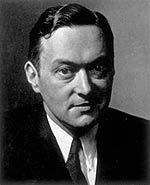'The
mass media creates images of events in our minds.'
Walter Lippmann (1922)
It is quite a scary thought to think that the media ultimately constructs our views of what is important in the social reality that we are living in. But it is definitely one that warrants consideration.
The term 'agenda setting' describes the process by which the mass media present certain issues frequently, deeming the public to perceive those issues as what is ultimately important in the world they live in.
In the last entry I discussed the co-constitution theory, which would suggest that this process could work both ways - society could set the agenda just as much as the media does. But with the media ultimately having control over what is fed into the minds of the public on a daily basis, agenda setting theories and research would suggest otherwise. The mass media has the power to filter and shape reality in a way that the individual does not.
The term 'agenda setting' describes the process by which the mass media present certain issues frequently, deeming the public to perceive those issues as what is ultimately important in the world they live in.
In the last entry I discussed the co-constitution theory, which would suggest that this process could work both ways - society could set the agenda just as much as the media does. But with the media ultimately having control over what is fed into the minds of the public on a daily basis, agenda setting theories and research would suggest otherwise. The mass media has the power to filter and shape reality in a way that the individual does not.
Above: Maxwell McCombs and Donald Shaw
Maxwell McCombs and Donald Shaw, prominent minds in the field of agenda setting theories and research, in the Chapel Hill (NC) study of 1968 showed there was a strong correlation between what residents thought was the most important election issue, and what the media presented as the most important election issue. By comparing the issue salience in this instance with regards to public perception and the news media, McCombs and Shaw were able to determine the degree to which the media tell us what to think about.
The sad truth is that most of the reality of what is going on in the world isn't represented by the media, especially not the commercial media. If an event does not satisfy a certain amount of news values, it simply doesn't make the cut, no matter how important it is in the grand scheme of things. A current example is the situation occuring in Syria, as we speak - Pro-Government militiamen have been accusing of mass murdering innocent villagers under the command of Syrian leader, President Bashar al-Assad (read more here). If mass murders were occurring in Australia under the command of our Government, it would be a huge part of the media agenda all around the world. Yet majority of the people I have spoken to about the issue had no idea it was even happening. Our people cannot relate to this situation at all, therefore it is just not important enough for the commercial Australian news media agenda.
So why do the media set the agenda in such a limited way?
Because they can. Because that's what gets the ratings.
Sad, but true.
Some strengths of the Agenda Setting theory are that it explains why the masses consider some issues more important than others. It also has predictive power - by considering the media agenda one can predict what the masses may deem as important at the time. Some weaknesses include that the news cannot create or conceal problems entirely. All they can do is alter the awareness of such. Also, the rise of social media is changing things altogether.
The more dependent a person is on the media (especially the commercial media, which is what majority of society follows) for information, the more susceptible that person is to media agenda setting. The challenge for citizens is to rise up against the mass media, and create the 'bandwagon' effect in a way that will promote positive social change all around the world. It is crucial for the individual to be critical of what they hear in the news, and always seek out information about the world for themselves.


No comments:
Post a Comment